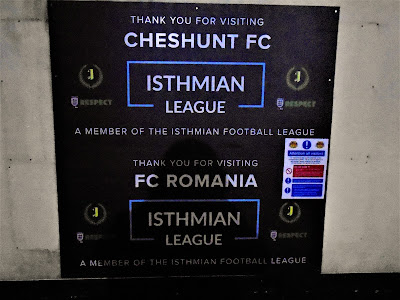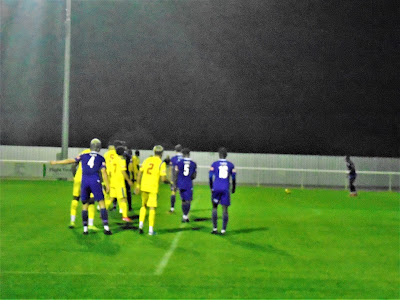FC Romania 0 Tooting & Mitcham United 1 (Isthmian League South Central Division)
Theobalds Lane, 7 October 2020
Theobalds Lane, 7 October 2020
Along with FC Deportivo Galicia,
FC Romania were one of London’s non-League clubs
I most wanted to see. Formed in August 2006 by a group of Romanian workers in
London who wanted to play in their spare time, they soon switched from Sunday
to Saturday football and gradually rose up to the semi-professional Isthmian League, where they now play in the South Central Division – the eighth tier of
the English pyramid. Since being denied promotion in 2012 due to their ground
not meeting Essex Senior League standards, they have shared Theobalds Lane with
Cheshunt, on north-east London’s fringes: an easy journey for me, and one that
I made with my friend Lillian, who often canvassed with me in December’s
election, and Orit, who was excited to be seeing another politically resonant
club.
Like many other English children who didn’t have a team to
support in the 1994 World Cup, I was captivated by the Romaniaside that beat Argentina 3-2 in a thrilling second round tie, with their
mercurial playmaker, Gheorghe Hagi. That summer
was when English clubs finally went for big-name overseas players in numbers:
the FA had banned them from signing professional foreigners until 1978, and
then they found players were reluctant to move here during the 1980s, first
because of the stringent work permit regulations and then the five-year ban from European
competitions after the Heysel disaster in
1985. Tottenham, who made waves when the FA's barriers dropped by signing two of Argentina’s World Cup
winners, Osvaldo Ardiles and Ricardo Villa, led the way again. Their surprise capture of Jürgen Klinsmann in July 1994 made headlines, but they also signed two
stars from Romania’s quarter-finalists – forward Ilie Dumitrescu and defender/midfielder Gheorghe Popescu,
while Sheffield Wednesday brought in full-back Dan Petrescu.
Before the deposition of Nicolae Ceauşescu – captured brilliantly in Harun
Farocki and Andrej Ujică’s film Videograms of a Revolution (1992) – English clubs were not able to sign
players from Romania in any case. One of the beneficiaries of UEFA’s ban on
English teams were Steaua Bucharest, who in May 1986 became the first and only
club within the Soviet sphere to win the European Cup. They beat Barcelona 2-0 on penalties in Seville after a 0-0 draw,
with goalkeeper Helmuth Duckadam emerging as the
hero, before fading back into obscurity. Three years later, and with Hagi in
their midfield, Steaua reached the final again. This time, they lost 4-0 to AC Milan, with the trio of Dutch stars who filled their quota of foreign players
allowed by UEFA at the time, and their core of domestic players who formed the
backbone of the Italian side that lost the World Cup final on penalties in
1994.
There were changes afoot in 1989: not just the Romanian revolution in December, but also UEFA planning to restructure the European Cup from a straight, unseeded knock-out with home and away legs to a World Cup-style league-cup hybrid, partly in response to Steaua reaching the 1986 final after beating the champions of Denmark, Hungary, Finland and Belgium. The political tensions around Romanian football of the time are captured in Corneliu Poromboiu's film The Second Game (2014), in which Poromboiu talks over a video recording of a match between Steaua and Dinamo Bucharest in December 1988 with his father, who refereed the game. They talk interestingly about how the two teams, for which nearly all of Romania's golden generation played, were affiliated with the army and the secret police, with Steaua being Ceauşescu's favourites, and both keen for him to fix it in their favour. (The match, as it obvious from the picture above, was played in driving snow – if it were any other set of teams, said Poromboiu sr., it would have been postponed.)
The opportunity Poromboiu's film misses is not talking about how the Steaua side that made two European Cup finals and formed the basis for the 1994 national team got broken up, and how and why Romania declined as a footballing force in the 21st century. After the Jean-Marc Bosman case was resolved in 1995, UEFA dropped the 'three foreigners' rule for European competitions and EU countries dropped such restrictions in their domestic leagues. Within the next decade, and especially after the EU expansion in 2004, Europe's best players became concentrated in the top western leagues – Spain, Italy, Germany and England. These nations now dominate the Champions League: since Porto beat Monaco in 2004, only Paris Saint-Germain, with their Qatari billions, have made the final. Without the same kind of oligarch owners as the biggest Russian teams, clubs from former Warsaw Pact countries have rarely threatened the knock-out stages, as their most promising players get disbanded across Europe, often vanishing into big clubs' squads, bouncing from loan to loan and failing to realise their potential.
This has obviously been detrimental to eastern Europe's national sides too - these days, it's only Spain and Germany who have been able to built successful teams around a nucleus of players concentrated at one or two clubs. My friend Chris (a frequent companion, at Ilford, Hendon and elsewhere) and I went to Bucharest in September 2017 and saw Romania play Armenia in a World Cup qualifier. With the side already unlikely to make it out of a weak group, the crowd in the impressive new national stadium booed the German coach Christoph Daum, and Romania laboured to a 1-0 win with a last-minute goal. A few of that team have played in England, before or since: centre-back Vlad Chiricheş had an underwhelming spell at Tottenham in 2013-15 after moving from Steaua; Adrian Popa left Steaua for Reading in 2017 and has since played 15 games in England, spending last season back on loan in Bucharest; Florin Andone has struggled at Brighton & Hove Albion, following the footsteps of Steaua's 1986 captain Ştefan Iovan, who became the first Romanian to play in England after he joined Brighton in 1991, but featured just six times. Other Romanians in England haven't had the best time: Florin Răducioiu, the star striker of the 1994 team, joined West Ham to much excitement in 1996 but left before the end of the season; Răzvan Raț had a similarly bad time with the Hammers; Adrian Mutu got sacked by Chelsea after failing a drug test and had to pay the club £15m in compensation.
In Bucharest, Chris and I also walked around Steaua's old training complex in Ghencea, the graveyards for those killed in the 1989 revolution, and the palace that the Ceauşescus built for themselves, which displaced an entire district, cost €3bn and is sinking under the weight of its own hubris (by 6mm a year). The tour guide told us this heaviness was partly due to Elena's love of chandeliers: the complex had 3,000. Unlike Romanian footballers of the time – concentrated at Steaua, who were Nicolae's chosen team – the leaders had freedom of movement, and Elena flew to Paris every morning to get a French croissant. Of all the Soviet satellite regimes, theirs was the most indulgent and the most corrupt; I doubt many in Romania saw a European Cup victory as an acceptable trade-off for their 24-year rule, nor a World Cup quarter-final as a worthwhile legacy.
Playing in the same bright yellow as the national side, FC Romania were established well before Romania joined the EU in 2013 (with Bulgaria, who also lit up the 1994 World Cup and haven't been as good since). Quite how Brexit will affect the club remains unknown: many but not all of the current squad are Romanian, and I would guess that they have applied for leave to remain after the UK leaves the European Union on 31 December, but have no idea if they have been successful, and they will almost certainly find it harder to recruit new players after freedom of movement ends. (I suspect a loophole will be found for Premier League clubs to sign whoever they want, that is unlikely to apply at this level.)
Getting the train through north-east London and then walking through the town, Lillian and I reflected that the area reminded us of our canvassing for Labour in December, when - among other things - we were desperately trying to elect a government that would scrap the hostile environment and preserve that freedom of movement. I read that FC Romania are still looking for a home that feels more like theirs, but have slowly built up a base in part by inviting Cheshunt fans to watch them when the host club are away - there was a crowd of 86 for this match, a vocal away support and a mix of nationalities following the home team. The programme had a list of Romanian phrases that you may hear on the terraces, a lot cleaner that the things that I guessed were yelled at Christoph Daum and his team when I was in Bucharest, and the club's long-serving manager, Ion Vintila, gives FC Romania a sense of constancy and was sat in front of us in the main stand during the second half.
You may have mentioned that here, I've discussed the match at hand in even less detail than usual. Like the Steaua-Dinamo clash in The Second Game, it was quite uneventful until late in the second half, when FC Romania's French defender Jesse Armoo got sent off for a second booking and Tooting & Mitcham United's Jack Rose broke through for a last-gasp winner. This was FC Romania's fourth defeat in a row, picking up from a difficult 2019-20; how easy it is for them to keep going at all amidst England's reactionary nationalist turn is yet to be seen.




No comments:
Post a Comment